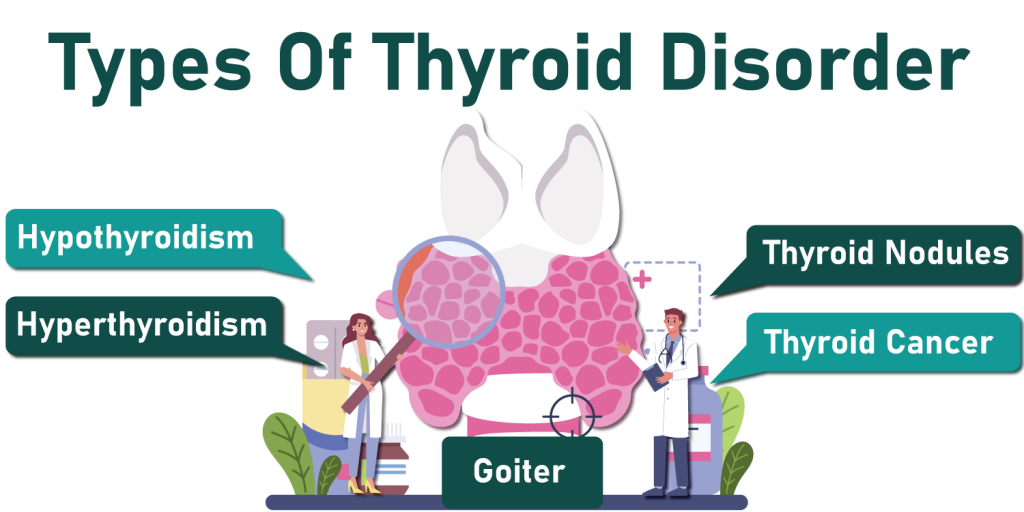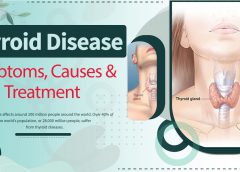Thyroid disease affects around 200 million people around the world. Over 40% of the world’s population, or 28,000 million people, suffer from thyroid diseases. In the United States, six out of ten cases of thyroid disease go undetected. The majority of people are unaware of thyroid symptoms and risks.
Thyroid disease and cancer are both under-recognized, and more has to be done to raise awareness. This blog covers everything one needs to know about thyroid disease.
What is Thyroid Disease?
The thyroid gland is found at the base of the neck, immediately below Adam’s apple. It has a butterfly-like form and encircles the windpipe.
T4 (thyroxine, which has four atoms of iodine) and T3 (thyroxine, which has three atoms of iodine) are two hormones that control your metabolism. These two hormones guide the body’s cells on how much energy to use. When your thyroid is healthy, it produces the appropriate quantity of hormones to keep the metabolism running properly.
When your thyroid isn’t functioning properly, it can create issues all over your body. Hyperthyroidism is a condition in which the thyroid hormone is produced in excess by the body. Hypothyroidism occurs when the thyroid hormone produced by the body is insufficient. Both of these conditions are serious and should be treated by a medical professional.
Types of Thyroid Disorder
There are varying categories of thyroid disorders. These include:

- Hypothyroidism: A condition in which the thyroid glands do not produce enough thyroid hormone.
- Hyperthyroidism: A condition in which there is excessive production of thyroid hormones
- Goiter: A condition in which the thyroid gland enlarges abnormally.
- Thyroid Nodules: A condition in which lumps develop in the thyroid gland
- Thyroid Cancer: Genetic alterations in thyroid cells (mutations)
Who is Affected by Thyroid Disease?
Men, women, babies, adolescents, and the elderly are all susceptible to thyroid disease. It may be present at birth (hypothyroidism), or it may develop as you become older (often after menopause in women).
What Causes Thyroid Disease?
Some of the common causes of the thyroid problem are:
â— Low iodine
â— After-effects of radiation therapy, thyroid surgery, and some medicines
â— Virus or bacterial infection of the thyroid gland
â— Nodules, or non-cancerous lumps, inside the thyroid
â— Inheritance of genetic disorders
â— Graves’ disease, an autoimmune illness, results in hyperthyroidism or excess production of thyroid hormones
â— Cancerous tumors on the thyroid gland
What are Some Common Symptoms of Thyroid Disease?
Let’s start with hypothyroidism, which is characterized by an underactive thyroid gland. In a nutshell, this means that everything in the body slows down.
â— Changes in hair and skin may be the first signs. People, for example, lose a lot of hair; their hair becomes coarse, brittle, and readily falls out; some even lose their brows, and their face and skin swell.
â— People can lose their hearing, their voice becomes raspy, their skin becomes very dry, there is less perspiration in the body, and they become cold-intolerant, which means they can’t endure cold at all.
â— There is also a slowing of heart action, a condition known as bradycardia. Patients with high blood pressure can also have raised blood pressure.
â— When it comes to the digestive system, patients frequently experience constipation. In addition to the weight gain, patients have a loss of appetite and are unable to effectively digest their food.
â— Menorrhagia, or profuse bleeding during menstrual periods, is highly common in women with hypothyroidism, and if it is not treated, it progresses to Amenorrhea or complete cessation of menstrual cycles.
When we talk about hyperthyroidism, we’re talking about an overactive thyroid gland. As a result, the body becomes hyperactive to the point of exhaustion.
So, when you see someone with hyperthyroidism, they are usually irritated and anxious. They are extremely thin, and their skin, due to an enhanced basal metabolic rate, always feels warm, sweaty, and moist. As a result, they tend to sweat profusely.
â— When it comes to their heart, these patients commonly experience palpitations, which makes them feel as though their heart is beating rapidly and loudly. As a result, the doctor will detect a rapid heart rate, also known as tachycardia.
â— When it comes to the digestive system, individuals experience regular bouts of loose motions that are either inexplicable or unrelated to any ailment.
â— When it comes to the reproductive system, most women suffer from oligomenorrhea, which simply means that they have very little bleeding during their menstrual cycles.
An important thing to keep in mind is the fact that Hypothyroidism and hyperthyroidism can induce menstrual irregularities as well as infertility in both men and women.
A thyroid condition, of course, cannot be identified only on a single symptom. A thyroid-related disease is usually diagnosed based on a range of symptoms.
How is Thyroid Disease Diagnosed?
Blood tests are one of the most reliable techniques to diagnose thyroid disease. Thyroid blood tests measure the number of thyroid hormones in your blood to determine if your thyroid gland is functioning normally. The blood sample is collected painlessly from a vein in the arm.
How is Thyroid Disease Treated?
The treatment for thyroid disease includes:
â— Anti-Thyroid drugs.
â— Radioactive iodine.
â— Beta-blockers.
â— Surgery.
â— Thyroid replacement therapy.
Can Yoga Help in Thyroid?
Yoga can be beneficial in various situations. These exercises, on the other hand, should not be used to replace any existing therapies or medications, but rather as a complementary therapy.
Because stress is one of the leading causes of thyroid difficulties, here are 5 Yoga asanas to help you feel better by treating it organically by stimulating the pharynx, avoiding diseases, and acting as a complementary therapy for thyroid disorders.
1. Sarvangasana or Shoulder Stand Pose
2. Matsyasana or the Fish Pose
3. Ustrasana or camel pose
4. Bhujangasana or Cobra pose
5. Savasana/Shavasana or corpse pose
Note: Before starting any yoga program, make sure you see your doctor.
Best Food For Thyroid Patients
Although adjusting your diet alone won’t get your thyroid hormone levels back to normal, avoiding certain foods and eating more of others can help your body absorb these hormones more effectively.
Food to Avoid
- Consumption of soy products should be done in moderation. If your iodine levels are low, soy can damage your thyroid’s ability to make hormones.
- Certain vegetables: cabbage, broccoli, kale, cauliflower, spinach, etc. are rich in goitrogens which impair the normal functioning of the thyroid. Thyroid patients with low iodine levels must avoid such vegetables.
- Sugar-rich processed foods slow down metabolism, causing weight gain, while fatty and processed foods are heavy in sodium, which thyroid patients should avoid.
- Caffeine and alcohol both have negative effects on the thyroid gland, and coffee interferes with the therapeutic characteristics of thyroid drugs by inhibiting their absorption in the intestine.
Food to Eat
The thyroid gland is the body’s powerhouse. Patients with hypothyroidism should consume a diet rich in vegetables, fruits, and lean meats.
- Iodine-rich foods (But in moderation)
- Antioxidant-rich fruits and vegetables
- Selenium ( sunflower seeds or Brazil nuts )
- Tyrosine ( meats, dairy, and legumes )
Is Thyroid More Common in Women?
For women, the risk is roughly ten times greater than for men. Thyroid issues in women can cause a wide range of issues.
- Intermittent, heavy, or missing periods:
- INFERTILITY: Anovulation is a disorder that makes getting pregnant difficult.
- Thyroid problems during pregnancy: Because thyroid abnormalities can be harmful to both the mother and the baby, they should be recognized and treated as soon as possible during pregnancy.
The Bottomline
Despite the risks that thyroid disease has on a person’s well-being, it remains a largely ignored health concern. We hope that this blog has helped you with all the information you need to know about this highly prevalent health disorder. At Kayawell, we have made it easy for you to talk to a health expert. You can find the best expert on thyroid disease and care near you here.

Leave a Reply
You must be logged in to post a comment.